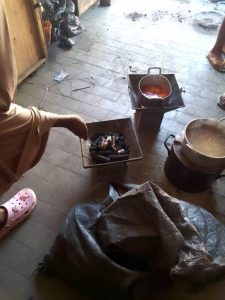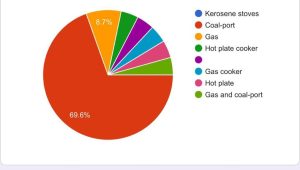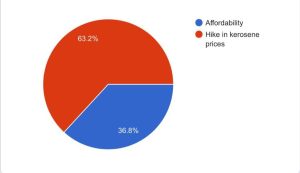By Sulaiman Aisha

Image shows how charcoal has taken a centre stage on UDUS campus
In the bustling campus life of Danfodiyo University, the struggle of punctuality is intertwined with the challenge of preparing a morning meal. Abubakar Fatima, a 200-level Microbiology student, has become synonymous with habitual late arrivals to her 8:a.m lectures.
However, her tardiness is not due to mere indifference but a battle against the rising cost of kerosene.
Speaking of her late arrival, she revealed to The News Digest Press, the difficulties she faces in enduring a modest breakfast before her early lecture due to the soaring price of kerosene– a once staple for quick cooking.
In her words, she said: “ I can’t starve myself to death. Going to class without breakfast is not my habit.”
The sudden spike in kerosene prices, from 800 to 850 per liter to an astonishing 1,120 Naira, forced Fatima to seek an alternative—charcoal.
“ Contrary to last semester, I couldn’t afford kerosene which makes cooking faster…as of early last semester, kerosene was sold at the rate of 800 to 850 Naira per liter, but all of a sudden it went to a peak of 1,120 Naira. And that was the story of how I substituted for charcoal. Though slower and energy-consuming. But it’s more affordable for an average Danfodite.”

Image shows how charcoal he taken a centre stage on UDUS campus
Similarly, Aisha Idris, a 100-level chemistry student, narrated that she prefers charcoal because of its affordability and reliability, compared to kerosene.
“I’m a 100-level student and I have been using charcoal from the beginning of the session till now, as kerosene became a commodity for the rich,” she explained.
“Most of the students living at the hostel have forsaken and abandoned kerosene because of the hike.”
Subsidy Removal
“ Living millions of Nigerians to fall into severe hardship,” this is the stark reality that unfolded after President Bola Tinubu removed fuel subsidies on May 29, 2023.
The brunt of the subsidy removal did not just hit people from around Nigeria, it however extends to different university campuses within the state, particularly in Usmanu Danfodiyo University, Sokoto.
The students of UDUS, living at the main campus have made a swift turn to coal port. At UDUS main campus, charcoal is now the order of the day. This was not how it used to be. Quite sad how the ebullient wave for kerosene stoves suddenly went sullen.
A few months back, the kerosene stove was in its cooking prime among students, but all of a sudden, the kitchen utensils went into abeyance as students started to use coal ports.
Charcoal Not the Best Substitute
Abdullahi Muri (pseudonym) shared his inability to reside in the school hostel due to health risks. He highlights his allergy, expressing concern about the adverse effects of inhaling charcoal smoke.
“ I am allergic to smoke. This is my biggest reason for choosing off-campus. I can’t stay at the school hostel because I know how inconvenient it will be with the smoke emitting from the charcoal, ” Said Abdullahi.
Expressing concern about the potential adverse of students’ well-being from inhaling smoke, doctor Bala Sokoto, explained that “inhaling smoke or dust can cause an obstruction of the lung, and if there is obstruction in the airway of the lungs, it may cause intermittent or periodic obstruction”.
Having Brazil at the Apex, according to research, Nigeria is the second largest charcoal-producing state in the world with 8% of the charcoal produced worldwide.
Nigeria’s total land area is said to be about 947,800 km2, with forests covering about 10 percent of the landmass. These forested areas are on a sharp decline daily due largely to the illegal cutting of trees.
Experts have observed that the diminishing number of tree cover and primary forests in Nigeria has exposed Nigerians to the dangers of heat waves, rise in sea level, flooding, and droughts associated with climate change.
A former Minister of State for Environment, Mr. Ibrahim Jibril unveiled that Nigeria loses 1.5 million trees daily due to logging, with a deforestation rate of 3.5 percent annually considered the highest globally.
A 2017 report by the Environmental Investigation Agency stated that over 1.4 million illegal rosewood logs (popularly known as Koso) worth $300m were exported to China from Nigeria, in connivance with top government officials. This led to the placing of a ban on the exportation of the species used for manufacturing luxury furniture.
“ We Switch to Charcoal Alternative”–UDUS Kerosene Vendors
In response to the escalating challenges posed by soaring kerosene prices, Labaran Abdul, a kerosene and charcoal vendor at UDUS hostel minimart, shed light on the challenges faced by sellers like him.
He emphasized difficulties encountered in procuring kerosene, attributing the scarcity to prolonged unsuccessful attempts at various filling stations.
“ The scarcity of kerosene at the hostel minimart is not our fault because what we buy is what we sell,” Abdul explained, “ Imagine I have been patronizing various filling stations in this town for not less than a week now without getting a liter,” he explained.
Similarly, Nafiu, also a kerosene seller, shared his concern on the issues of scarcity of kerosene.
He said, “ I swear to God, I am tired. Could you believe I went to town yesterday looking for kerosene by all means and came back with empty jerricans. And I have decided to continue selling charcoal till further notice. Thank God, because charcoal is less expensive and more readily available than kerosene. Students who are aware of the reality are flocking to buy it.”
69.6% UDUS Students Use Charcoal — Survey Reveals
In a recent survey conducted by The News Digest Press, 69% of students of Usmanu Danfodiyo University are now relying on charcoal for cooking, following the removal of subsidy.
 The chart illustrates the percentage of each cooking utensil used by students
The chart illustrates the percentage of each cooking utensil used by students
The News Digest gathered that 52% of UDUS students had been using charcoal before the subsidy removal, however, the subsidy removal increased the fair percentage to the scary 69.6%.
The survey involving twenty-five students, shed light on the challenges faced by the students of UDUS, accessing affordable cooking alternatives.

The chart illustrates the percentage of students’ affordability on cooking alternative
Experts Insight: Ayodeji Omilabu Weighs In
Ayodeji Omilabu, a climate change enthusiast, highlighted the environmental consequences associated with the increased use of charcoal. Omilabu emphasized that the process of cutting down trees for charcoal production not only increases carbon dioxide but also contributes to greenhouse gas emissions, further exacerbating the challenges of global warming in an already carbonized environment.
His words: “Deforestation reduces the number of trees available to absorb the carbon dioxide and leads to higher levels of greenhouse gasses again in the atmosphere and as a result of deforestation these are less to the more intense heat we use, increase carbon dioxide and they all increase global warming.
“Deforestation makes us lose biodiversity and a lot of echo systems, because lots of lives are depending on that tree in that area someone is cutting. With the subsidy removal, there is more demand for charcoal and this will lead to deforestation at its peak.
“The best way to ameliorate this is planting more trees which is a very personal strategy to combat deforestation. Everybody should be conscious and at least plant one tree in a year as a company, organization, religious body, and as individuals. Just as apples are planting trees and forests in the Amazon across Brazil, South America, and others.”
He further added that “ policy from the government for planting trees should come into play. It can start from schools, ministries all around us”.
